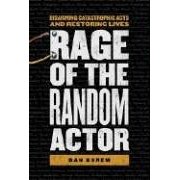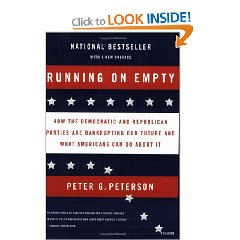This book has several gems that keep it from dropping to a two, but it also has a number of rather severe warts that prevent it from going to a four.
The gems first:
1) Although we have seen all too many history of the neo-cons, who seem to adopt policies of convenient (failing on the left, they move to the right, where nuttiness is an easier sell), I liked the concise summary of key concepts (preemption, regime change, unilateralism, and benevolent hegemony) and the distinction between the neocon theory and the Bush practice. To this I would have added a penchant by both to substitute ideological fantasy for real-world intelligence, and a predilection to lie to the public (and Congress) to achieve short term ends regardless of the long-term consequences.
2) I also liked his brief description of the concentric circles around terrorists, including radical religious terrorists (some would equate the extreme right evangelicals in the USA with the extreme left evangelicals led by Bin Laden), naming as the author does the sympathizers, fellow-travelers, the indifferent, the apolitical, and those sympathetic in varying degrees to the West. It is helpful for the author to address, at least in passing, that extremism flourishes when the middle drops out–when the mass of people are indifferent or apolitical, they give the extremists on the left and right a free ride to lunacy at public expense.
3) The author focuses two chapters on the need to reform American soft-power institutions, while also reforming international institutions helpful to applying power on behalf of legitimacy. He is appropriately critical of the many members of the United Nations whose power is illegitimate, 44 of them being dictators.
4) Finally, on page 164, he has a moderately interesting graphic that illustrates Legitimacy versus Effectiveness among internationally active institutions, and also lists the relative merits of formal versus informal mechanisms, clearly implying that legitimacy comes at a cost of flexibility and non-accountability.
Now for the warts:
1) This is a lightweight series of undergraduate lectures. A graduate level person can skim this double-spaced pint-sized book in an hour.
2) The author has been publicly castigated by Charles Krauthammer, in an Op-Ed “Fukuyama's Fantasy,” for fabricating a specific quote for which there is a television and audio record to support Krauthammer's accusation. While I am no fan of Krauthammer's ideological view, I do agree that this fabrication lends support to those who suggest that the author is loose with the truth and in a revisionist/self-apologist mode.
3) Intellectually, from a multi-disciplinary perspective, this work is at best a C+ for a graduate level personality. The author leaves out too many important references. On the subject of whether sovereignty should be respected or displaced, anyone who fails to integrate the brilliant work of Philip Allott, The Health of Nations: Society and Law Beyond the State (see my review of this work for a concise summary), is simply not serious about deep discussion of the need to restructure international affairs and the increasingly integrated globe where local threats impact on global stability, and global illegalities impact on local stability. It is time to overturn the Treaty of Westphalia and revisit some of the pioneering work from the 1970's (e.g. Richard Falk), in order to develop new political-legal, socio-economic, ideo-cultural, and techno-demographic constructs for sharing our wisdom (The Tao of Democracy: Using Co-Intelligence to Create a World That Works for All) and sharing our planet, humanity, and rule book (High Noon 20 Global Problems, 20 Years to Solve Them).
Having read and reviewed over 600 books and a few seminal DVDs relevant to the themes this author has reviewed, I put the book down with two thoughts:
1) Premature fame of an author is a burden on the uninformed reader. Like Tom Clancy, who had exactly one great book in him, and then had to rely on a series of ghost writers and co-authors, this author could benefit from making better use of industrious graduate students able to give him more “due diligence” to broaden the value of his mature reflections.
2) In consequence, this book misses so much relevant information that I am at a complete loss as to how to summarize the gaps concisely but will take a stab at it, consistent with my “lists” here on Amazon:
a) The author focuses on the neoconservative legacy and its relation to power and democracy, but in so doing, completely misses the larger discussion of virtual colonialism, predatory immoral capitalism, the costs of the Cold War, the treasonous decisions by Wall Street to rely on laundered drug money for liquidity and of US politicians to rely on cheap oil to win elections and keep the bribes coming, and other major issues. While the author does single out the Millennium Report of the United Nations, he does so in the context of the ideological debate over whether one should use power to address symptoms or root causes. He ignores completely the possibility that immoral and irrational US policies, spending (double deficit) and behavior may have something to do with our impending demise.
b) Strategy is not a word that appears in this book, at least not to where I could see it (it is not in the index either). While the author talks about soft power with a bow toward Joe Nye, e.g. The Paradox of American Power: Why the World's Only Superpower Can't Go It Alone and he talks about alliances versus freedom of action, this book is devoid of the kind of strategic thinking that Colin Gray, author of Modern Strategy, would look for in a work such as this purports to be.
c) Democracy in America is not discussed.
d) The book is antiseptic. The author starts with a fabricated quote from Krauthammer and ends with a quote from Madeline Albright (the one that repressed alarming reports on terrorism) about how Americans should lead because they can “see further” than other nations.
I recommend Clyde Prestowitz's Rogue Nation: American Unilateralism and the Failure of Good Intentions Peter Peterson's Running on Empty: How the Democratic and Republican Parties Are Bankrupting Our Future and What Americans Can Do About It Jonathan Schell's The Unconquerable World: Power, Nonviolence, and the Will of the People and Tom Coburn, Breach of Trust: How Washington Turns Outsiders Into Insiders as well as all books by Max Manwaring, Ralph Peters, and myself.









